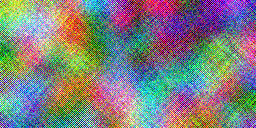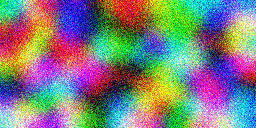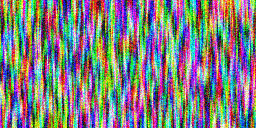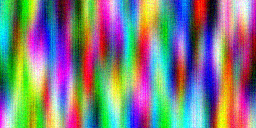C++11
(Update: only afterwards did I notice that a similar approach has already been tried --- with more patience with regards to the number of iterations.)
For each pixel, I define a set of neighbor pixels. I define the discrepancy between two pixels to be the sum of squares of their R/G/B differences. The penalty of a given pixel is then the sum of the discrepancies between the pixel and its neighbors.
Now, I first generate a random permutation, then start picking random pairs of pixels. If swapping the two pixels reduces the sum of the total penalties of all pixels, the swap goes through. I repeat this for a million times.
The output is in the PPM format, which I have converted into PNG using standard utilities.
Source:
#include <iostream>
#include <fstream>
#include <cstdlib>
#include <random>
static std::mt19937 rng;
class Pixel
{
public:
int r, g, b;
Pixel() : r(0), g(0), b(0) {}
Pixel(int r, int g, int b) : r(r), g(g), b(b) {}
void swap(Pixel& p)
{
int r = this->r, g = this->g, b = this->b;
this->r = p.r; this->g = p.g; this->b = p.b;
p.r = r; p.g = g; p.b = b;
}
};
class Image
{
public:
static const int width = 256;
static const int height = 128;
static const int step = 32;
Pixel pixel[width*height];
int penalty[width*height];
std::vector<int>** neighbors;
Image()
{
if (step*step*step != width*height)
{
std::cerr << "parameter mismatch" << std::endl;
exit(EXIT_FAILURE);
}
neighbors = new std::vector<int>*[width*height];
for (int i = 0; i < width*height; i++)
{
penalty[i] = -1;
neighbors[i] = pixelNeighbors(i);
}
int i = 0;
for (int r = 0; r < step; r++)
for (int g = 0; g < step; g++)
for (int b = 0; b < step; b++)
{
pixel[i].r = r * 255 / (step-1);
pixel[i].g = g * 255 / (step-1);
pixel[i].b = b * 255 / (step-1);
i++;
}
}
~Image()
{
for (int i = 0; i < width*height; i++)
{
delete neighbors[i];
}
delete [] neighbors;
}
std::vector<int>* pixelNeighbors(const int pi)
{
// 01: X-shaped structure
//const int iRad = 7, jRad = 7;
//auto condition = [](int i, int j) { return abs(i) == abs(j); };
//
// 02: boring blobs
//const int iRad = 7, jRad = 7;
//auto condition = [](int i, int j) { return true; };
//
// 03: cross-shaped
//const int iRad = 7, jRad = 7;
//auto condition = [](int i, int j) { return i==0 || j == 0; };
//
// 04: stripes
const int iRad = 1, jRad = 5;
auto condition = [](int i, int j) { return i==0 || j == 0; };
std::vector<int>* v = new std::vector<int>;
int x = pi % width;
int y = pi / width;
for (int i = -iRad; i <= iRad; i++)
for (int j = -jRad; j <= jRad; j++)
{
if (!condition(i,j))
continue;
int xx = x + i;
int yy = y + j;
if (xx < 0 || xx >= width || yy < 0 || yy >= height)
continue;
v->push_back(xx + yy*width);
}
return v;
}
void shuffle()
{
for (int i = 0; i < width*height; i++)
{
std::uniform_int_distribution<int> dist(i, width*height - 1);
int j = dist(rng);
pixel[i].swap(pixel[j]);
}
}
void writePPM(const char* filename)
{
std::ofstream fd;
fd.open(filename);
if (!fd.is_open())
{
std::cerr << "failed to open file " << filename
<< "for writing" << std::endl;
exit(EXIT_FAILURE);
}
fd << "P3\n" << width << " " << height << "\n255\n";
for (int i = 0; i < width*height; i++)
{
fd << pixel[i].r << " " << pixel[i].g << " " << pixel[i].b << "\n";
}
fd.close();
}
void updatePixelNeighborhoodPenalty(const int pi)
{
for (auto j : *neighbors[pi])
updatePixelPenalty(j);
}
void updatePixelPenalty(const int pi)
{
auto pow2 = [](int x) { return x*x; };
int pen = 0;
Pixel* p1 = &pixel[pi];
for (auto j : *neighbors[pi])
{
Pixel* p2 = &pixel[j];
pen += pow2(p1->r - p2->r) + pow2(p1->g - p2->g) + pow2(p1->b - p2->b);
}
penalty[pi] = pen / neighbors[pi]->size();
}
int getPixelPenalty(const int pi)
{
if (penalty[pi] == (-1))
{
updatePixelPenalty(pi);
}
return penalty[pi];
}
int getPixelNeighborhoodPenalty(const int pi)
{
int sum = 0;
for (auto j : *neighbors[pi])
{
sum += getPixelPenalty(j);
}
return sum;
}
void iterate()
{
std::uniform_int_distribution<int> dist(0, width*height - 1);
int i = dist(rng);
int j = dist(rng);
int sumBefore = getPixelNeighborhoodPenalty(i)
+ getPixelNeighborhoodPenalty(j);
int oldPenalty[width*height];
std::copy(std::begin(penalty), std::end(penalty), std::begin(oldPenalty));
pixel[i].swap(pixel[j]);
updatePixelNeighborhoodPenalty(i);
updatePixelNeighborhoodPenalty(j);
int sumAfter = getPixelNeighborhoodPenalty(i)
+ getPixelNeighborhoodPenalty(j);
if (sumAfter > sumBefore)
{
// undo the change
pixel[i].swap(pixel[j]);
std::copy(std::begin(oldPenalty), std::end(oldPenalty), std::begin(penalty));
}
}
};
int main(int argc, char* argv[])
{
int seed;
if (argc >= 2)
{
seed = atoi(argv[1]);
}
else
{
std::random_device rd;
seed = rd();
}
std::cout << "seed = " << seed << std::endl;
rng.seed(seed);
const int numIters = 1000000;
const int progressUpdIvl = numIters / 100;
Image img;
img.shuffle();
for (int i = 0; i < numIters; i++)
{
img.iterate();
if (i % progressUpdIvl == 0)
{
std::cout << "\r" << 100 * i / numIters << "%";
std::flush(std::cout);
}
}
std::cout << "\rfinished!" << std::endl;
img.writePPM("AllColors2.ppm");
return EXIT_SUCCESS;
}
Varying the step of neighbors gives different results. This can be tweaked in the function Image::pixelNeighbors(). The code includes examples for four options: (see source)




Edit: another example similar to the fourth one above but with a bigger kernel and more iterations:

One more: using
const int iRad = 7, jRad = 7;
auto condition = [](int i, int j) { return (i % 2==0 && j % 2==0); };
and ten million iterations, I got this:

